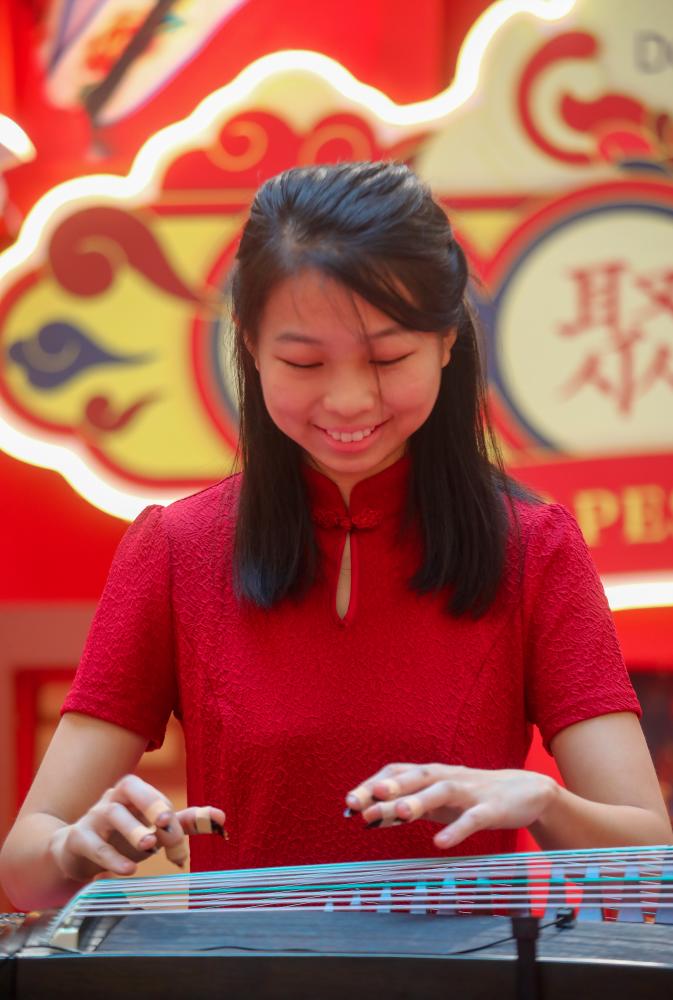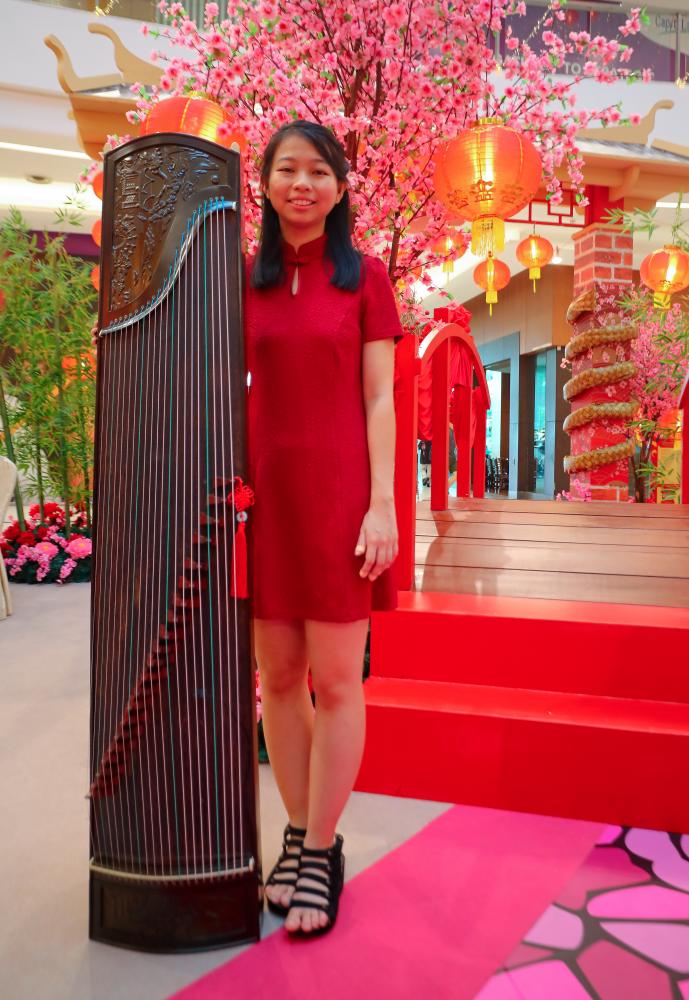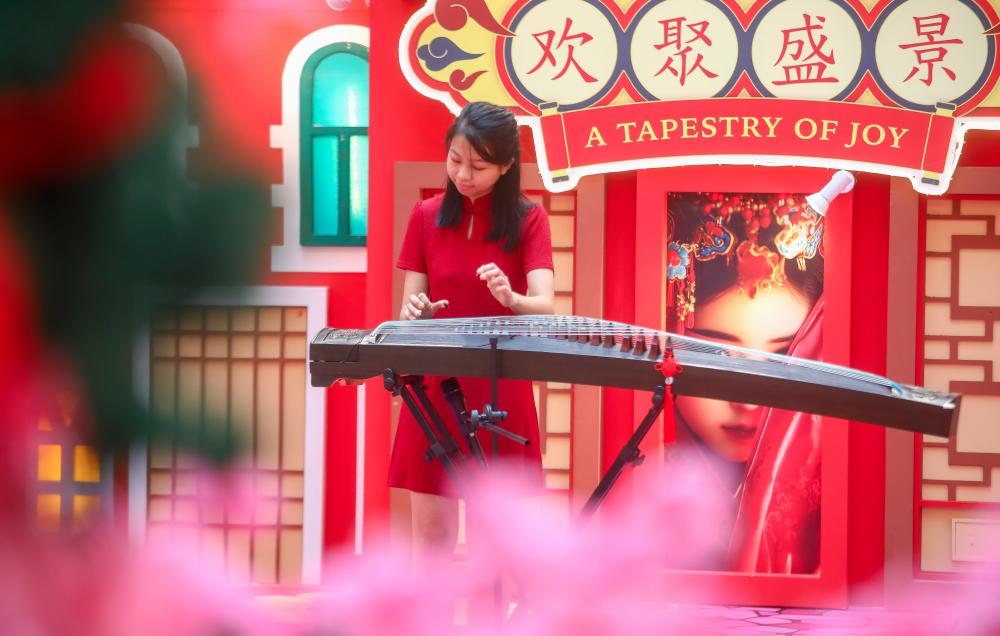A good way to instil interest among the younger generation in traditional Chinese musical instruments would be to combine traditional and contemporary music, said Sim Li Mei, 27, a guzheng player who hails from Klang.
She grew up in a family steeped in traditional Chinese art and music. Her father is an artist but also plays various musical instruments. Her sister plays the guzheng while her brother plays the erhu.
After watching her sister play the guzheng, she decided to follow her footsteps at the age of eight. Sim has performed on stage as a solo artist or alongside her siblings. If you manage to catch her performances, do not be surprised to hear traditional tunes along with international pop tracks and local Malay songs.
“Combining traditional instruments with pop music or other modern genres is a great way to spark interest among younger audiences and introduce them to the beauty of traditional music.
“Music is a universal language and collaborations between traditional and modern instruments can bridge cultural and generational gaps. It is an innovative way to ensure traditional instruments remain relevant and appreciated,” said Sim.
Appealing to Gen Z
We asked Sim if Gen Z youth show any interest in learning traditional musical instruments in today’s fast-paced world with easily accessible music via apps and smartphones.
“Yes, I believe many in Gen Z are interested in exploring traditional musical instruments. Our fast-paced work and studies often lead us to seek hobbies that help us relax and reconnect with ourselves. Traditional music offers a therapeutic and artistic outlet.
“Moreover, social media platforms have played a huge role in promoting these instruments, giving them more exposure and making them more appealing to younger audiences,” explained Sim.

Preserving culture
Traditional musical instruments hold immense cultural value, representing the history, art and soul of a community.
“Beyond their aesthetic appeal, they teach us patience, perseverance and discipline. Playing traditional music is also deeply personal and healing, as it allows us to connect with our inner selves.
“Preserving these instruments ensures future generations can continue to appreciate their beauty and significance while staying connected to their heritage. I started playing the guzheng when I was eight years old, and over time, my appreciation for its complexity and cultural significance deepened,” she said.
Sound of music
Sim said the sound of the guzheng has a positive effect on her.
“The sound of the guzheng has a calming and soothing effect on me. What is unique about the instrument is its ability to express a wide range of feelings – cheerful and lively tones as well as sentimental and melancholic ones.
“I find music often speaks more powerfully than words. While words can sometimes be misinterpreted, on the other hand, music conveys pure emotion, creating a personal and universal connection for everyone who listens,” she said.
Not only does her mind become calmer, but by playing the guzheng, she has learned to become more focused and disciplined.
“What I love most about playing the guzheng is its ability to ground me. Whenever I play, it forces me to focus entirely on the present moment, reminding me to take life one step at a time. The instrument allows me to fully immerse myself in the emotions conveyed by the music, and I strive to become part of the melody.
“It was evident to me whenever my mind is preoccupied with other thoughts, my ability to play the instrument diminishes. Playing the guzheng is both a discipline and an emotional connection for me,” she said.

Music transcends boundaries
Playing the guzheng may look easy but Sim faced many challenges.
“For me, the most challenging aspect of mastering the guzheng is controlling my breath. Proper breath control significantly impacts the pacing and fluidity of
my performance.
“I also play other Chinese instruments, such as the liuqin and the dizi (Chinese flute). Playing the dizi taught me the importance of regulating my breath, a skill I have carried over into my guzheng practice. Each instrument offers its own lessons, but they all contribute to my growth as a music player,” she said.
One of her most memorable performances was in 2022 during a Malaysia Day celebration.
Sim and her brother played the guzheng and erhu alongside musicians from diverse cultural backgrounds. She said the harmony between the instruments was truly inspiring.
“I felt a profound sense of unity through the music. It was especially gratifying to see our friends from other races embracing the Chinese guzheng, highlighting the universality of music and its ability to bring people together,” she said.
Looking forward
Sim plans to explore more traditional instruments, not only Chinese ones, but also those from other cultures, such as Indian and Malay instruments. She is also interested in the unique musical instruments of Sabah and Sarawak.
“I am also keen on collaborating with musicians who play various instruments to experiment with new sounds and create innovative musical experiences. Through these efforts, I hope to expand my understanding of music while sharing its universal language with a broader audience,” added Sim, who is an architect by profession.









